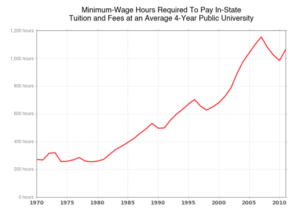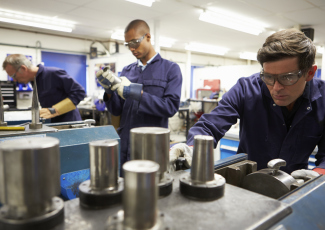What Minimum Wage Has to Do With Community Colleges
By AACC Staff
June 19, 2015
Raising the minimum wage is the American thing to do. It directly affects students and allows them to pay their way through college.
The minimum wage has been at the top of the national conversation lately, with Los Angeles becoming the latest — and largest — city (after Seattle; San Francisco; and Emeryville, California) to increase the minimum wage to $15 an hour by 2020. Well that’s great, you may be thinking, but what does that have to do with community colleges?
Here are three reasons why those of us who care deeply about community colleges should also care about raising the minimum wage:
It’s about college affordability. It used to be that a summer’s worth of work at minimum wage would pay for a year of a student’s tuition at a public university. Not anymore. Greg Schoofs tells the story on BuzzFeed:
In the summer of 1976, just before my freshman year at the University of California at Berkeley, I worked as a groundskeeper at a neighborhood swim club. … I earned just $2 an hour.
But that was more than enough to pay my entire UCB tuition and fees. With one summer of full-time work, I or any real farmworker could make $960, about 50% more than the $637.50 for a whole academic year’s tuition and fees at one of the best universities in the world.
By comparison, even if the movement for a $15 minimum wage succeeded, a summer’s worth of work today would cover only slightly more than half of the current tuition and fees for the 2014–2015 academic year. You would have to work more than 1,000 hours — or more than 6 months — at minimum wage to pay the average in-state tuition and required fees at a U.S. public university. Compare that figure to the early 1970s, when it took less than 300 hours, or about seven and a half weeks of full-time work.
Raising the minimum wage means allowing our students to realistically pay their way through college without accruing insurmountable debt — debt that often keeps students from completing their degrees.

Sources: National Center for Education Statistics, DOE (college costs); Department of Labor (minimum wage)
Minimum wage workers are our students. Today, almost half a million college graduates, including 200,000 associate degree holders, are working minimum-wage jobs. This figure is nearly 71 percent higher than it was a decade ago, according to the Bureau of Labor Statistics.
In fact, the vast majority of workers who would benefit from a minimum-wage hike are adults who, much like the students we serve in our community colleges, work part or full time to support a family. Furthermore, minimum-wage workers often come from the same diverse backgrounds we see represented in our student bodies: People of color represent 42 percent of minimum-wage workers and 32 percent of the total workforce.
In other words, increasing the minimum wage will directly affect community college students.
Americans support it. Americans are increasingly supportive of both free community college and a minimum-wage hike. According to an AP poll, six in 10 Americans favor raising the minimum wage, with nearly half strongly in favor; only 2 in 10 are opposed. Similarly, the poll found that nearly 6 in 10 Americans think the government doesn’t do enough to help students, and more than half — 56 percent — favor Obama’s plan for free community college.
In so many ways — from affordability to student demographics to popular opinion — raising the minimum wage is profoundly connected to supporting community college students. We should all get behind any initiative that helps move our students toward success, both in school and in life.





